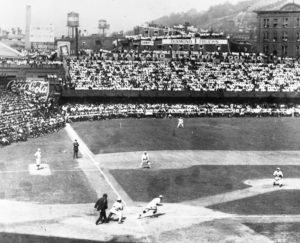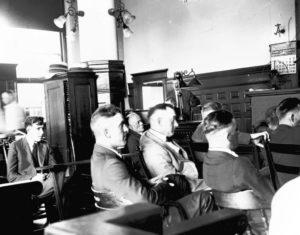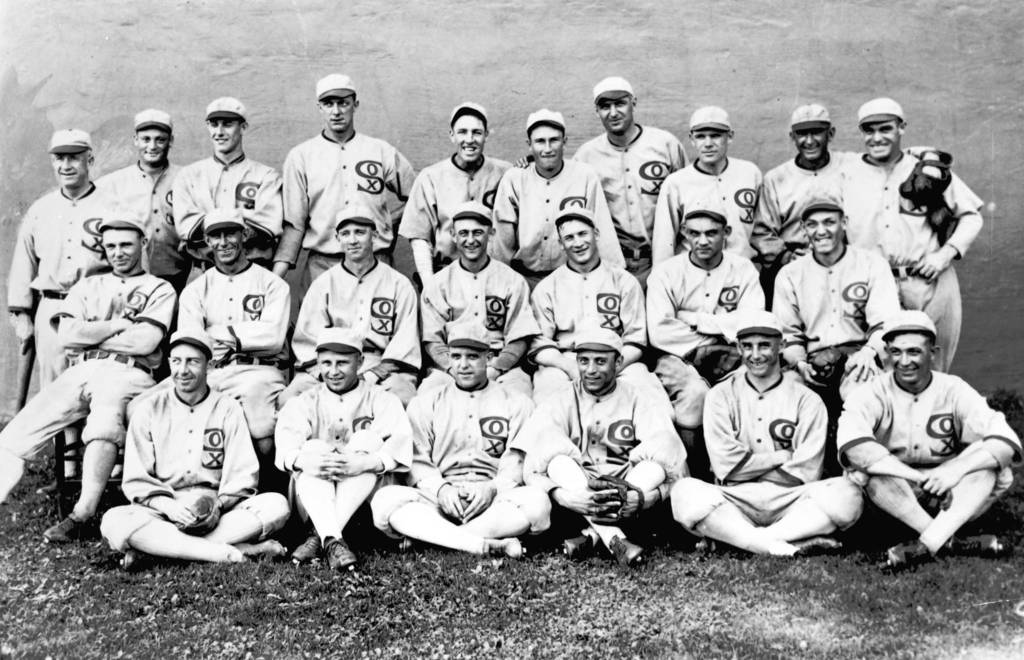The World Series
Baseball remains a staple of American culture for more than a century. Therefore, when scandal strikes in an event as big as the World Series, it becomes a monumental public catastrophe. The event occurred during a wave of nativism in America following the first World War. One of the expressions of patriotism is the fan involvement in sports; unsurprisingly, in the tumultuous year, 1919, the World Series represented the social unrest that spread throughout the country. Most notably it reflected the flawed labor exploitation that average Americans constantly faced.
The Chicago White Sox were the clear favorite to win the series. They had won in 1917 while the Great War was in full force, providing people with a much needed source distraction and enjoyment. America’s involvement in the war left little of professional baseball in 1918, when half of the league went to serve. Those who remained went to work for companies, hired largely to play for company teams to draw crowds. This gave players control of their salary, selling their skills to opportunities with the greatest payout. The company teams were outside of the constraints of contract obligations that would strangle players and benefit team owners. Stingy team owners were the root of this problem; leaving athletes vulnerable to propositions from gamblers. Specifically, the White Sox owner Charles Cominskey was known for underpaying his players as much as the worst teams in the league.
The Chicago White Sox lost the eight game Series to the Cincinnati Reds on October 9, 1919.
Rumors of match fixing began as early as the first game of the series on October 1, 1919. Although, these doubts were extremely unpopular and not recognized by mainstream news outlets as credible. It wasn’t until the following year that people began to doubt the legitimacy of the World Series. Finally, in September of 1920 a grand jury assembled to investigate the scandal after several newspaper exposes. After the grand jury implicated the eight players in the crime. Before the jury came to this conclusion, Cominskey’s lawyer pressured Eddie Cicotte, Claude Williams, and Joe Jackson to confess in exchange for immunity. The three players later retracted their statements and the documents stolen.
The prosecution used pinch hitter William Burns as their star witness during the trial, a member of the White Sox under indictment. The New York Times reported from the trial that Cicotte received $10,000 and Jackson and Williams $5,000. After planning the conspiracy in a New York hotel, Burns planned the scheme with Arnold Gandil, the $100,000 pay out was to be financed by gambler Arnold Rothstein as well as other gamblers. Gandil met with McMullin, Williams, Felsch, Cicotte, Risberg, and Weaver in a Cincinati hotel room to conspire. Burns testified outfielder “Shoeless” Joe Jackson did not attend this meeting.
After just two hours of deliberation, the jury ruled that the players were “not guilty” citing the prosecution’s failure to prove that the players intended to defraud the public. Despite being legally acquitted, the eight players received a lifetime ban from playing professional baseball. Those who were found to have no involvement in the crime were given $1,500 bonus from Cominskey, the bonus was the individual difference in pay between winning and losing the World Series. Following the scandal, the 1919 White Sox were dubbed the Black Sox.
The scandal violated American values that were so closely intertwined with baseball, especially at a time when people were looking for wholesomeness to escape the foreign and domestic chaos. The verdict of the Black Sox trial shifted  the blame from players to gamblers. This emboldened the nativist movement, the media held foreign named gamblers accountable for betraying the American people. The most notable gambler cited in the case was Rothstein, a businessman of Jewish decent which likely contributed to the anti-Semitic sentiments that many Americans already held. The narrative that outside influences corrupted America’s sports is tied to the radical movement that created a deep fear of foreigners that threatened society. Henry Ford, American businessman told the Sporting News,
the blame from players to gamblers. This emboldened the nativist movement, the media held foreign named gamblers accountable for betraying the American people. The most notable gambler cited in the case was Rothstein, a businessman of Jewish decent which likely contributed to the anti-Semitic sentiments that many Americans already held. The narrative that outside influences corrupted America’s sports is tied to the radical movement that created a deep fear of foreigners that threatened society. Henry Ford, American businessman told the Sporting News,
“Because a lot of dirty, long-nosed, thick-lipped, and strong-smelling gamblers butted into the World Series-an American event, by the way-and some of said gentlemen got crossed, stories were peddled that there was something wrong with the way the games were played.”
Baseball’s reputation had been stained by the catastrophe of the 1919 World Series, calling into question the legitimacy of several other games. And generally gave Americans the sense that they were being scammed. The purity of the game was lost following the series, although it did highlight the exploitation of the labor in all spheres of the workforce. Another result of the scandal was the appointment of a commissioner to oversee major league baseball.
Bachin, Robin F. “At the Nexus of Labor and Leisure: Baseball, Nativism, and the 1919 Black Sox Scandal.” Journal of Social History 36, no. 4 (2003): 941-62. http://www.jstor.org/stable/3790358.
Special to The New,York Times. (1921, Jul 22). BURNS SAYS PLAYERS FIRST MADE OFFER. New York Times (1857-1922) Retrieved from http://library.ramapo.edu:2048/login?url=https://search.proquest.com/docview/98338726?accountid=13420

Hi, I plan on citing this article for a research project using MLA 9th edition format, could you give me the details?